1. Virtanen R, Savola JM, Saano V, Nyman L. Characterization of the selectivity, specificity and potency of medetomidine as an alpha 2-adrenoceptor agonist. Eur J Pharmacol. 1988; 150:9–14. PMID:
2900154.
2. Yildiz M, Tavlan A, Tuncer S, Reisli R, Yosunkaya A, Otelcioglu S. Effect of dexmedetomidine on haemodynamic responses to laryngoscopy and intubation : perioperative haemodynamics and anaesthetic requirements. Drugs R D. 2006; 7:43–52. PMID:
16620136.
3. Prys-Roberts C, Greene LT, Meloche R, Foëx P. Studies of anaesthesia in relation to hypertension. II. Haemodynamic consequences of induction and endotracheal intubation. Br J Anaesth. 1971; 43:531–547. PMID:
5089931.

4. Shribman AJ, Smith G, Achola KJ. Cardiovascular and catecholamine responses to laryngoscopy with and without tracheal intubation. Br J Anaesth. 1987; 59:295–299. PMID:
3828177.

5. Edwards ND, Alford AM, Dobson PM, Peacock JE, Reilly CS. Myocardial ischaemia during tracheal intubation and extubation. Br J Anaesth. 1994; 73:537–539. PMID:
7999498.

6. Priebe HJ. The aged cardiovascular risk patient. Br J Anaesth. 2000; 85:763–778. PMID:
11094595.

7. Zhan-Ying G, Chang-Ming W, Shuai T, Lin-Lin T, Yu-Feng H. Comparison of effects of different doses dexmedetomidine on inhibiting tracheal intubation-evoked haemodynamic response in the elderly patients. J Clin Diagn Res. 2015; 9:UC10–UC13. PMID:
26500982.

8. Scheinin B, Lindgren L, Randell T, Scheinin H, Scheinin M. Dexmedetomidine attenuates sympathoadrenal responses to tracheal intubation and reduces the need for thiopentone and peroperative fentanyl. Br J Anaesth. 1992; 68:126–131. PMID:
1347229.

9. Thompson JP, Hall AP, Russell J, Cagney B, Rowbotham DJ. Effect of remifentanil on the haemodynamic response to orotracheal intubation. Br J Anaesth. 1998; 80:467–469. PMID:
9640152.

10. Ko BJ, Oh JN, Lee JH, Choi SR, Lee SC, Chung CJ. Comparison of effects of fentanyl and remifentanil on hemodynamic response to endotracheal intubation and myoclonus in elderly patients with etomidate induction. Korean J Anesthesiol. 2013; 64:12–18. PMID:
23372880.

11. Prys-Roberts C, Foëx P, Biro GP, Roberts JG. Studies of anaesthesia in relation to hypertension. V. Adrenergic beta-receptor blockade. Br J Anaesth. 1973; 45:671–681. PMID:
4147153.

12. Kale SC, Mahajan RP, Jayalakshami TS, Raghavan V, Das B. Nifedipine prevents the pressor response to laryngoscopy and tracheal intubation in patients with coronary artery disease. Anaesthesia. 1988; 43:495–497. PMID:
3261548.

13. Mikawa K, Nishina K, Maekawa N, Obara H. Comparison of nicardipine, diltiazem and verapamil for controlling the cardiovascular responses to tracheal intubation. Br J Anaesth. 1996; 76:221–226. PMID:
8777101.

14. Sun HL, Wu TJ, Ng CC, Chien CC, Huang CC, Chie WC. Efficacy of oropharyngeal lidocaine instillation on hemodynamic responses to orotracheal intubation. J Clin Anesth. 2009; 21:103–107. PMID:
19329013.

15. Stoelting RK. Blood pressure and heart rate changes during short-duration laryngoscopy for tracheal intubation: influence of viscous or intravenous lidocaine. Anesth Analg. 1978; 57:197–199. PMID:
565157.
16. Min JH, Chai HS, Kim YH, Chae YK, Choi SS, Lee A, et al. Attenuation of hemodynamic responses to laryngoscopy and tracheal intubation during rapid sequence induction: remifentanil vs. lidocaine with esmolol. Minerva Anestesiol. 2010; 76:188–192. PMID:
20203546.
17. Park SH, Shin YD, Yu HJ, Bae JH, Yim KH. Comparison of two dosing schedules of intravenous dexmedetomidine in elderly patients during spinal anesthesia. Korean J Anesthesiol. 2014; 66:371–376. PMID:
24910729.

18. Ok HG, Baek SH, Baik SW, Kim HK, Shin SW, Kim KH. Optimal dose of dexmedetomidine for sedation during spinal anesthesia. Korean J Anesthesiol. 2013; 64:426–431. PMID:
23741565.

19. Shin HW, Yoo HN, Kim DH, Lee H, Shin HJ, Lee HW. Preanesthetic dexmedetomidine 1 μg/kg single infusion is a simple, easy, and economic adjuvant for general anesthesia. Korean J Anesthesiol. 2013; 65:114–120. PMID:
24023992.

20. Lawrence CJ, De Lange S. Effects of a single pre-operative dexmedetomidine dose on isoflurane requirements and peri-operative haemodynamic stability. Anaesthesia. 1997; 52:736–744. PMID:
9291757.

21. Keniya VM, Ladi S, Naphade R. Dexmedetomidine attenuates sympathoadrenal response to tracheal intubation and reduces perioperative anaesthetic requirement. Indian J Anaesth. 2011; 55:352–357. PMID:
22013250.

22. Basar H, Akpinar S, Doganci N, Buyukkocak U, Kaymak C, Sert O, et al. The effects of preanesthetic, single-dose dexmedetomidine on induction, hemodynamic, and cardiovascular parameters. J Clin Anesth. 2008; 20:431–436. PMID:
18929283.

23. Prys-Roberts C, Meloche R, Foëx P. Studies of anaesthesia in relation to hypertension. I. Cardiovascular responses of treated and untreated patients. Br J Anaesth. 1971; 43:122–137. PMID:
5550843.
24. Stone JG, Foëx P, Sear JW, Johnson LL, Khambatta HJ, Triner L. Risk of myocardial ischaemia during anaesthesia in treated and untreated hypertensive patients. Br J Anaesth. 1988; 61:675–679. PMID:
3207540.

25. Misiołek H, Wojcieszek E, Dyaczyńska-Herman A. Comparison of influence of thiopentone, propofol and midazolam on blood serum concentration of noradrenaline and cortisol in patients undergoing non-toxic struma operation. Med Sci Monit. 2000; 6:319–324. PMID:
11208330.
26. Bertrand M, Godet G, Meersschaert K, Brun L, Salcedo E, Coriat P. Should the angiotensin II antagonists be discontinued before surgery? Anesth Analg. 2001; 92:26–30. PMID:
11133595.

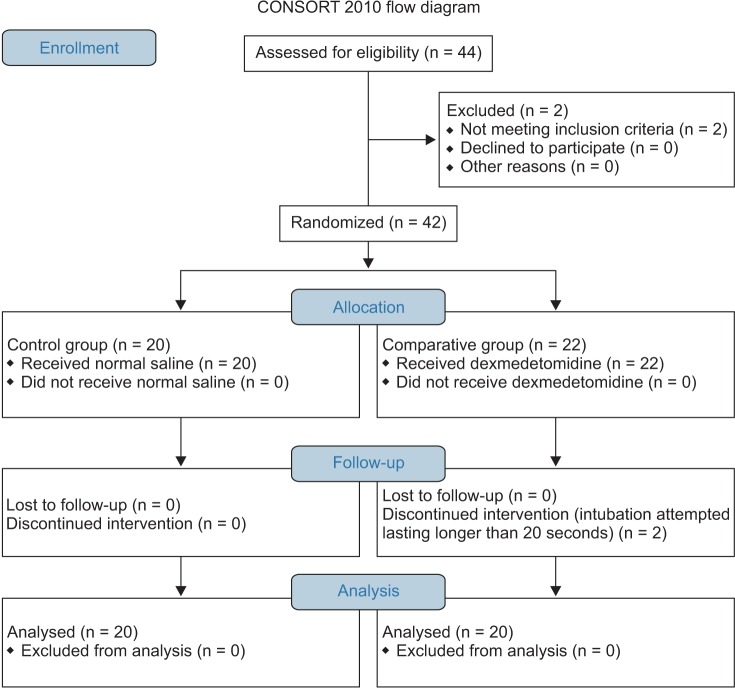
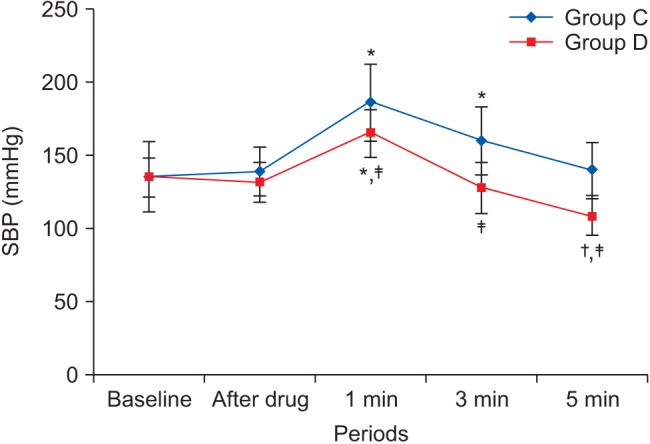
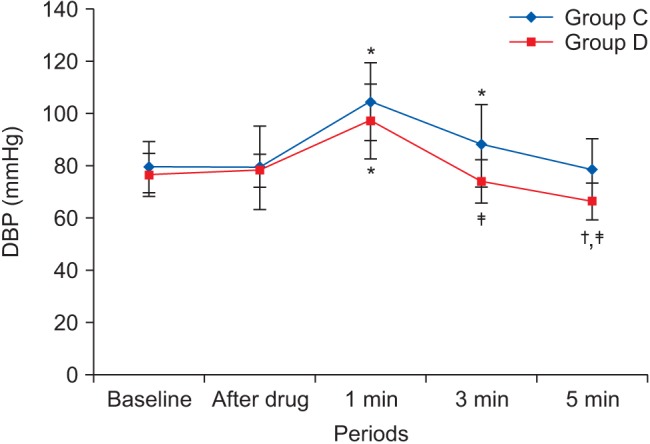
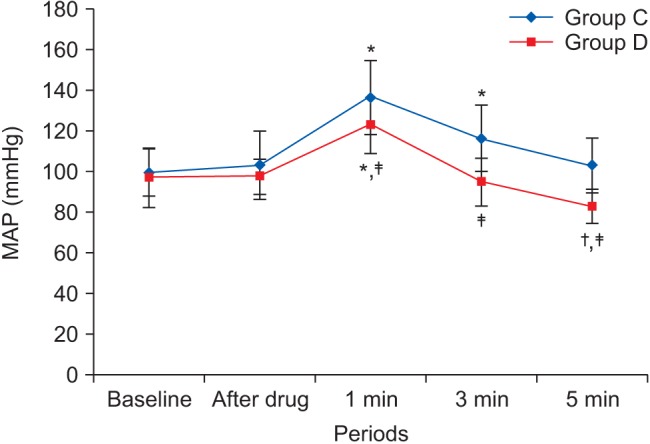
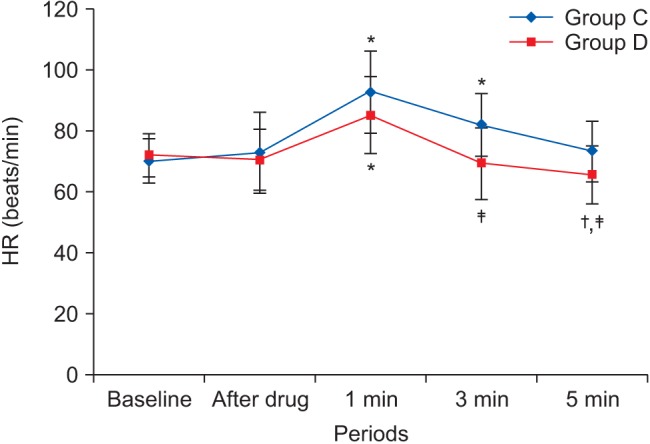




 PDF
PDF Citation
Citation Print
Print



 XML Download
XML Download